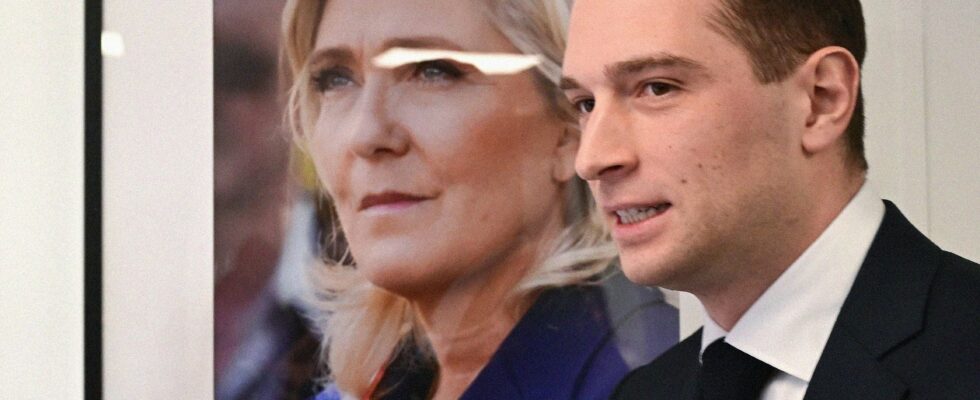During the debate between the two rounds of 2022, a strategy was established for the president candidate Emmanuel Macron: “We noted that Marine Le Pen had a lot of difficulty with the figures, explains an advisor to the president. The idea was therefore to bombard it with it in order to obtain the ‘lost gaze’ effect – terrible when you claim to run a country.” The strategy worked. On April 20, 2022, the National Rally candidate appeared much less “capped” than Emmanuel Macron. Without it equaling the “crash” of the 2017 debate – “where she [avait] achieved the feat of shaming her own voters”, says the philosopher Marcel Gauchet – but on numerous occasions, Marine Le Pen had seemed drowned in her files, incapable of responding to the numerical arguments of the president in place.
Did Gabriel Attal theorize the same strategy for his duel with Jordan Bardella on May 23 on France 2? In any case, the effect was of the same kind: correcting a semantic approximation here, taking up the low market share there, the Prime Minister displayed his technical superiority with a smirk, calling on the viewers to witness: “You type on Google, and you will see who is right!”… Opposite, Jordan Bardella, 28 years old, looked like a student who had worked well on his sheets but had not managed to get up to speed. The next day, the comments had noted it – the polls, less so – and Emmanuel Macron, not yet back from New Caledonia, challenged Marine Le Pen for a duel before the European elections… Why change a winning strategy?
To put it with the wisdom of grandmothers: it’s that “it paid off”, but that it doesn’t pay off anymore (or in any case, less and less).
Firstly because Emmanuel Macron’s reputation as a “good manager” has faded over the course of his mandates: the unprecedented worsening of the debt, the downgrading of public services, or even the endless deterioration of the balance commercial have got the better of his image as “Mozart of finance” (as he was nicknamed at the time when he advised François Hollande at the Elysée). And if the seriousness of the president continues to convince a loyal electoral base, a doubt has settled in the heads of many citizens as to the gap between the “grand permanent oral” that Emmanuel Macron succeeds with flying colors and the results for the country.
A counterproductive strategy
Second reason: televised demonstrations of the superiority of winners competent members of Macronie on the “thugs” of the National Rally are in the process of becoming counterproductive. Because they catalyze the contempt with which the middle and working classes feel viewed by part of the political, economic and cultural elite. Moral override on societal issues – for example, when we conflate any concern about immigration issues with racism. Intellectual overhang, when we reject any popular diagnosis in the name of economic expertise. “The French are bad at economics,” we hear repeated over and over again. Maybe. They nevertheless know what the reality of their daily life is, and the evolution of their place in society. Explaining to them that they are too stupid to understand what is good for them is a stubbornness that leads to nothing, except the ever greater success of populism at the ballot box.
This is the crucial point of the divide that torments our nation. In liberal democracies – which we cherish – the elites must justify their privilege of influence by carrying out a mission: to take charge of the general interest and therefore, the diagnosis of all sociologies. However, for decades, we have been experiencing a crisis of representation in both senses of the term: both in the image that public debate gives of the middle and working classes – racist “bumps” (aggressive version) or poor people who-have-one-life-to-hang (miserabilist version). But also in the little echo that is given to their aspirations, their daily lives, their tastes and their mental universes.
It is on this crisis of representations that Marine Le Pen has built her strategy for at least fifteen years now. “Marine” – as it is called in many places – has gradually built up popularity among a (majority!) sociology of French people who feel despised by the traditional parties. Faced with this, demonstrations of competence have become ineffective, even counterproductive. Questioning an RN activist on the reasons which pushed her to support the Lepéniste movement, the PS-Place publique candidate Raphael Glucksmann was thus answered (he reported this to the Grand Jury on RTL on May 7): “Because Marine is the only one who is not ashamed of us in the photo.” Much more than on programmatic questions, it is on this essential point of political philosophy that traditional parties should open their eyes: we cannot be ashamed of those we are tasked with representing.
.
